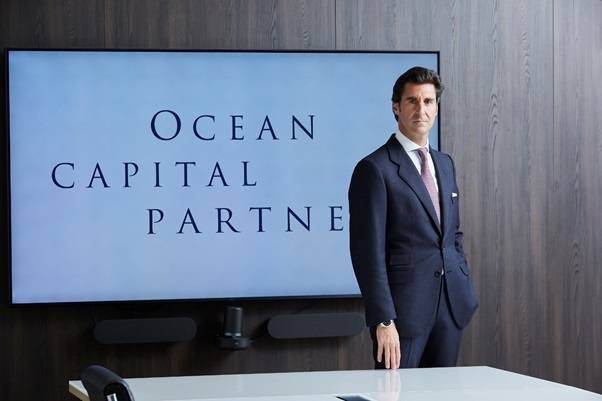by Mercedes Mateos Mateos
José Luís Almazán Palomino is the CEO of Ocean Infrastructures Management, Managing Partner of Ocean Capital Partners Group and Vice President of the Spanish Association of Port Investors.
The profile stands out for three reasons. He is a port businessman, executive, manager and investor of port assets. In his professional career, his expertise for twenty years in the port sector makes José Luís Almazán Palomino a great personality in the sector managing assets with a value of 1 billion € . He is Managing Partner of the Ocean Capital Partners Group, one of the Spanish business groups with a long history and family-run business in the port engineering sector. Ocean Capital Partners has developed expertise with fifty years in the national and international market work, this makes them leaders and flag bearers in investment financial consulting and port asset management.
The business group carries out projects and operations that reach 1,000 million euros. Its businesses, through concessions, are the management, exploitation and promotion of marinas, container and passenger terminals. The latest project of José Luís Almazán Palomino the marina of the Port of Malaga has been recognized for its sustainability with an international award “Tourism Excellence” in Fitur. In addition, they have just been granted the management of a new marina in the Malaga port of San Andrés through its partners in the Qatar fund Al Alfia and the American group IGY.
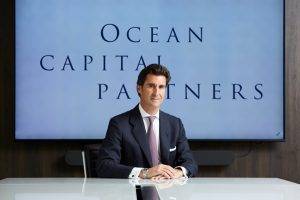
You are a businessman, executive, investor and port asset manager. How have you grown professionally from your initial days and now as a port asset manager, investor and how has your journey been so far?
I have been linked to the port sector all my life. In 2003 I started working as general manager in a port authority for the Spanish public administration. Ten years later, in 2013, I made the leap to the private sector and since then I have been managing port assets. I started as a consultant working for the infrastructure fund, Queensland Investment Corporation, an Australian pension infrastructure fund that we still represent in Spain.
QIC is an Australian state of Queensland fund from which we bought a significant percentage of one of the world’s leading container terminal operators. Over the years we started to see some investment opportunities in assets that QIC had no interest in and we thought it made sense to invest in. So, we looked at investing outside QIC with our own resources, together with our partners and some investors who invest jointly with us.
In this way, we began to invest in other types of assets, specifically in passenger terminals and marinas, which is where our focus is now. We have been doing this investment work through Ocean Capital Partners since 2013.
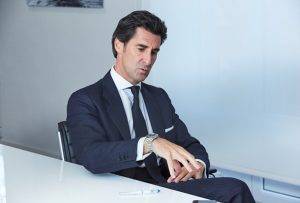
In the Ocean Capital Partners group of companies, how does the process of investing in port assets work?
We work with two options, organic and inorganic growth. One of the things we do the most are tenders issued by the public administration to invest and manage a port asset for a period of time. It is a tender where a bid is presented with the technical capacity, the economic solvency, the management and investment project, and the creation of value for the environment of the project in that tender. And it is the port authority that decides which project is the most interesting to develop, both in terms of value creation and in terms of having the best chances of success in the area. Another of the factors that the port authority also values when selecting projects is the most solid business model, the one that contributes most to the payment of fees compared to the rest of the candidates, and the project that makes the most sense, compared to the rest of the projects.
Once the competition is launched, one of the things we do in our company, Ocean Capital Partners, is to look for the right partners. If we see that it makes sense and it is a project that we are interested in and that we can present a winning project, we look for the right partners, we look for the resources, we structure the financing, we do the project, the study, the financial models and finally we present it.
If we are fortunate enough to present the best offer and if we are awarded the contract, we create the appropriate company, we structure the financing, we award the works, we do all the project management, we finish the works, we hire the teams and we put the port asset to work and manage it with its teams. This is the main part of what we do. And then we stay behind the port asset, helping and accompanying the management team, serving in the company through the board of directors and the management committee of each of the companies.
As a professional in the investment sector, how do you perceive the investment market currently at a national and international level?
The maritime port logistics sector, in general, has become extremely attractive in recent months, but it has many challenges. There have been huge changes due to the impact of Covid. First of all, in the passenger terminals, we have had a very big impact, we have investments in some terminals with traffic to Morocco where the border has been closed for two years, so the impact has been enormous. But in the logistics sector in general, the process of vertical integration of the shipping companies has accelerated the process of concentration, and we are seeing how the fact that there has been less supply for some time has caused skyrocketing prices of. The process of concentration, vertical integration and change that was expected to take place in fifteen years, is happening in fifteen months. The occurrence has been observed among all the intermediaries, the “free for orders”, the cargo considerers, are changing, this means that the shipping lines are gaining a lot of weight and there are many operations and acquisitions.
There is a change in the sector in general. It is a good moment for the logistics sector, for the shipping lines, but it is a complicated time for the terminals, depending on the case. Like everything else, it is a time of change in which the paradigm of the sector is shifting. It is no longer the way it was a year ago and, like everything else, there are companies that are suffering a lot and have fewer opportunities. It is a time of change that represents a challenge, a risk, but also an opportunity.

What are the most important professional projects that you have worked upon?
We made investments and divestments in a global operator, Group Maritime TCB, of a container terminal whose shareholder was the Australian pension fund QIC, of which we bought 40% of the company together with another Portuguese fund, Finpro. The company had terminals in Spain, Turkey, Latin America, in several countries and we were working on to increase the scale of the company, helping it, accompany the sale process of the majority shareholder. We sold the company to the Danish group APM Terminals linked to Maersk. The project was worth 900 million euros, was at the time, the first and most relevant operations in the port sector. This was in 2015 in the process of vertical integration and consolidation of the maritime port sector. Then on a personal basis, from our company, Ocean Capital Partners, we have invested in the passenger terminal in Malaga, wherein this project we worked on the concession of the terminal and the licenses with a local partner, a well-known Andalusian businessman, Domingo Torres and with a shipping company, also a partner of ours, as well as our investment in the passenger terminal in Algeciras with one of the main operators. Moreover, we are also closely associated to the mega-yacht project in Malaga. In the yacht sector we have collaborated through a Qatari fund in the mega yacht marina in Barcelona, to later run different projects in Spain. We were also fortunate enough to win a project for a port in Mallorca, Balearic Islands, which is a very interesting place. And two years ago, we got a project to build and develop a mega-yacht marina in Malaga. This is a project we develop with our American partners IGY, and is currently in progress, having a great potential in the near future. IGY linked to the world’s leading mega-yacht marina called Island Global Yachting, which operates in New York, Miami, the Caribbean, and in Europe, London, Sete in France and Puerto Cervo in Sardinia. They are the main operator of mega yatch marinas in the world with 5000 mega-yachts associated, most of them doing the Caribbean and Mediterranean transit every year, 3, 500 are clients of this platform. It is the benchmark that we have set in the world. We have partnered exclusively to carry out projects in Spain and this project in Malaga is, for the moment, the one we have developed together up to date. We are looking at many other projects.
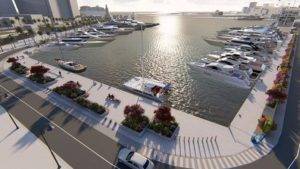
Due to the current situation, do you now have to invest more in supply chains to make them more resistant?
What is happening is that this Covid situation has accelerated the process. Which was expected to take 10 to 15 years, the pandemic has accelerated it by 15 months. There is a major concentration of cargoes in the shipping companies. In addition, there is another issue, goods have to be sent door to door rather than port to port, which means that integrated logistics chains are fundamental. We are also seeing a paradigm shift along with use of all the disruptive technology, which has reached the world of infrastructures and logistics chains where, in the end, the one who has the power is the one who has the platform for interaction with the end customer. Let’s say it’s the platforms like Amazon. The person who has that interaction platform is the one who has the capacity to reach the customer, the one who has the power of the end customer’s data.
In the end, we are seeing how all these operations are looking for fully integrated and competitive logistics chains. There is a very relevant fact which is that all institutional investors are the ones investing in logistics infrastructure, but also in the end customers and one of the issues in which they also care & invest is the environment.
How important are Environmental, Social and Governance, ESG, issues?
ESG issues are fundamental, they are being demanded by the institutional client and also by the end customer. The logistics chains are also going to compete in terms of CO2 emissions capacity .We are seeing how the logistics chains measure the carbon footprint and how this is an element for the end customer to decide whether their product goes one way or another and this environmental sensitivity is another element to take into account that will undoubtedly influence competition in the logistics chains.
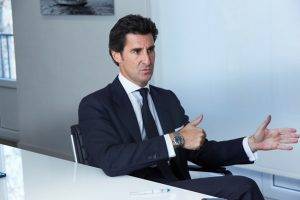
What volumes of capital do you manage through the QIC fund and through the projects with Ocean Infrastructures Management operations?
The Queensland Investment Corporation, QIC, fund is of value 92 billion AUD, although we are in the fund managing the infrastructure segment which is about 2800 billion AUD, approximately. We have been managing assets worth one billion euros, part of which we have diversified. We work with deals from 100 million to 1 billion. And now, we invest our own money in deals of all sizes. We are doing smaller operations from 10 million up to 100 € million. In relation to the parameters, the QIC fund is 92 billion AUD, the QIC infrastructures is 2800 million and we have been managing assets of 1billion euros with a reduced team of 200 employees.
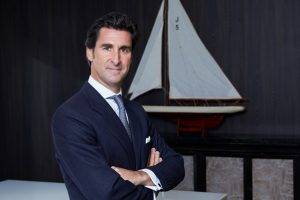
What type of portfolios do you work with through the Queensland Investment Corporation fund?
Queensland is a fund with 92 billion Australian dollars in assets. The Anglo-Saxon model is quite different from Spanish model. Here pension funds invest in government bonds in Spain but in Australia, they can invest in infrastructure. QIC is a pension fund belonging to the pensioners in the state of Queensland. It is a sovereign wealth fund that has a division or section that invests in infrastructure. It invests in toll roads, airports, car parks, water companies, gas terminals and ports. And at Ocean Capital Partners, we have been running this fund in Spain since 2013, from which we have generated several operations in ports. The objective is to invest in the very long term, the longer the better.
How is the sector financed?
Here the way of financing is Project Finance. They are infrastructures, they are long-term concessions where you have a physical infrastructure that can be mortgaged and with a reasonably predictable cash flow generation, so the economical and feasible way to do it in the port world is to do Project Finance. It is financing where the collateral is the asset itself, the concession that you have, can be mortgaged. As I said, in Europe the interest rates are very competitive, extraordinarily competitive, and with an equity debt financing percentage are of 65%.
What are the main services provided by your companies?
We have a company called Ocean Infrastructures Management which is one of the leading companies in Global Marine Port Consultancy. We work in the port industry and we are solely, exclusively dedicated to the port sector. Our company is the only company that works entirely in the port sector. Within the port sector, we operate upon the whole chain of port services providing 360 degree services. We have a very experienced and capable technical team that is currently working on a lot of projects in Spain, the Middle East, Dubai and Saudi Arabia, which includes the project for the port in the new city of Neon. We are working also for multiple international clients, like the World Bank, and with Ibero American clients. We are the benchmarking company that works in the port sector. We work mainly in Spain with private clients, about 90% are private clients, and we are working in several projects in Latin America, around 30% of our team are there.
What kind of services does the Ocean Capital Partners Group offer?
We work a lot for banks, investors, financiers, investment funds, we do everything from technical due diligence, strategic advisory, planning, to purely technical engineering projects, port detailing, and project management. We currently are doing project management for a few port projects also. Our team also accomplishes a lot of financing, we arrange a lot of funds to purchase port assets, working in the field of Mergers and Acquisitions.
I have done a lot of well-known projects in the port sector of mergers and acquisitions of sale and purchase linked to the world of funds, the world of port operators, we also do a lot of environmental analysis and studies. We do the whole value chain through Ocean Infrastructures Management. So, we are very much aware of what interesting opportunities there are for investments in port projects, and of who the potential investors could be, and to select the most appropriate operators, and the best industrial partners. And when we detect a product that we think makes sense, we bet for that product, we look for the industrial partner that we think will be suitable, that will accompany us or others in the project. We look for the investment partner, we prepare the whole package with the company, Ocean Infrastructures Management, and sometimes through Ocean Capital Partners, we also contribute by investing in capital and also have our management capabilities to accompany the board and the management team.

What is the key to your business?
The key to our business is our team. We have the best talents, in our company. Here in our companies, we always take the top graduates at college. We have brilliant people in the company who then go through a training process and furthermore, they do an MBA. In our companies, we combine technical skills with financial and management skills along with hyper-specialization within the ports sector.
In fact, we don’t do everything, we only do one type of things. Our strong point is that we work in the port sector. In the port sector, we have the expertise to work with the best talent. We invest a lot of time and resources to hire the best talent and align people with our purpose. Hence, we try to create value in our port projects, covering all needed aspects, from feasibility studies, to technical design project management, financing, management, merges and acquisitions, always in the port sector, which I have to say is quite large.














